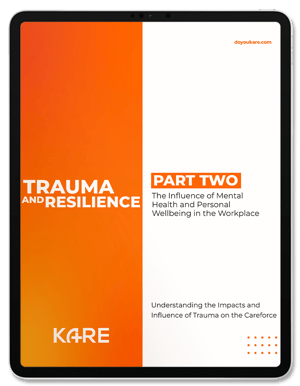WHITEPAPER
Trauma and Resilience:
Part Two
The Influence of Mental Health and Personal Wellbeing in the Workplace
KARE has conducted an extensive study on how trauma affects today's careforce. The findings of this study will be released as a 3-part series.
Please submit the form to receive part 2 of the report.
The careforce that dedicates their lives to seniors reports a higher number of average adverse events compared to the general population, and even the larger health care professional community. As Trauma-Informed Care and Cultural Competency are incorporated into your practices, it is vitally important that the same compassion and outreach is extended to the careforce. It is likely that members of your careforce are resilient survivors of trauma, and as part of the strong post-acute care community, everyone has a duty to recognize and address this impact of trauma and the potential for resilience.
This 3-part series, will help you better understand:
- How Adverse Childhood Experiences (ACEs) of the post-acute careforce compare to the general population.
- The impact of ACEs and the COVID-19 pandemic on the physical and mental health of frontline staff.
- Which factors of toxic stress, ACEs, and social determinants of health have the greatest impact on workplace wellbeing.
- The current state of the workforce’s social determinants of health.
Sign up to download Part 2 of the report.
Haven't had a chance to download Part One? Download the report here.WHITEPAPER
Benefits Preferences of an Empowered Care Force.
Sign up to download the report.
Recently, KARE conducted a comprehensive study involving more than 1,300 caregivers and communities. We have compiled the findings and transformed them into an easily accessible and downloadable PDF. This insightful document encompasses a range of valuable information, including:
- What benefits frontline caregivers find are most impactful.
- The biggest divergence between what management thinks is important to a frontline caregiver and what actually is highly valued by the care force.
- Recommendations for where leadership will see the most value and engagement from their workforce as they continue to build appealing traditional and non-traditional benefits programs.
Download this paper today to see the results!

WHITEPAPER
Trauma and Resilience: Part Two
The Influence of Mental Health and Personal Wellbeing in the Workplace
KARE has conducted an extensive study on how trauma affects today's careforce. The findings of this study will be released as a 3-part series.
Please submit the form to receive part 2 of the report.
The careforce that dedicates their lives to seniors reports a higher number of average adverse events compared to the general population, and even the larger health care professional community. As Trauma-Informed Care and Cultural Competency are incorporated into your practices, it is vitally important that the same compassion and outreach is extended to the careforce. It is likely that members of your careforce are resilient survivors of trauma, and as part of the strong post-acute care community, everyone has a duty to recognize and address this impact of trauma and the potential for resilience.
This 3-part series, will help you better understand:
- How Adverse Childhood Experiences (ACEs) of the post-acute careforce compare to the general population.
- The impact of ACEs and the COVID-19 pandemic on the physical and mental health of frontline staff.
- Which factors of toxic stress, ACEs, and social determinants of health have the greatest impact on workplace wellbeing.
The current state of the workforce’s social determinants of health.
Haven't had a chance to download Part One? Download the report here.